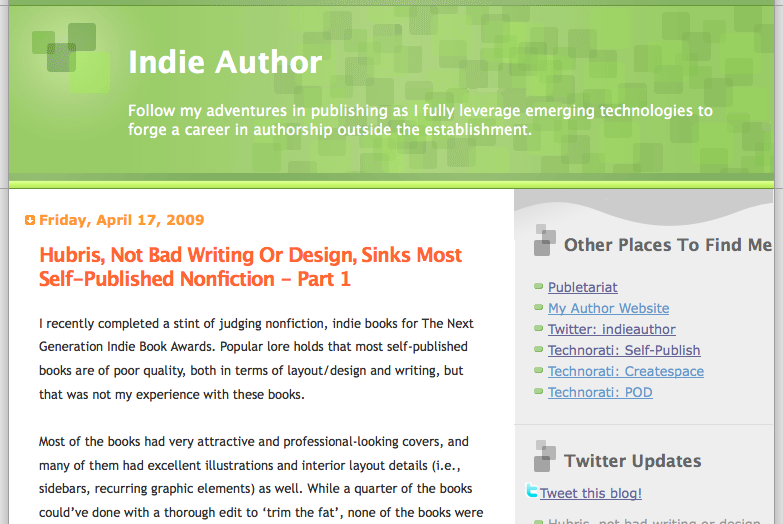 April Hamilton of Publetariat has a very interesting and important blog entry called Hubris, Not Bad Writing Or Design, Sinks Most Self-Published Nonfiction. In it she describes judging book for the Next Generation Indie Book Awards – including books about weight loss and Youtube marketing by people who are wholly unqualified to cover the topic. She writes:
April Hamilton of Publetariat has a very interesting and important blog entry called Hubris, Not Bad Writing Or Design, Sinks Most Self-Published Nonfiction. In it she describes judging book for the Next Generation Indie Book Awards – including books about weight loss and Youtube marketing by people who are wholly unqualified to cover the topic. She writes:
The tendency of so many authors to base an entire book or belief system on false correlations, or even mere coincidence, was astonishing to me, as was their complete lack of awareness that their ability to formulate a possible cause-and-effect relationship does not make that relationship valid, nor make them experts in either the cause or the effect.
There are many possible explanations for the first woman’s weight loss, but based on little more than intuition she’s concluded that hazelnuts were the key to her success. She’s not remotely qualified to design a safe and effective diet plan, yet here she is, promoting her hazelnut diet as a surefire, safe solution for anyone wishing to lose weight quickly.
If the YouTube guy had come up with a successful strategy to get the celebrity’s attention or the late-night talk show mention, that would be worthy of sharing with the world. In this case, he simply had an incredible stroke of luck that occurred entirely outside his control or even immediate awareness. Yet here he is, claiming he can show anyone how to recreate the same outcome.
I don’t really have anything to add to this except to say this is a very important topic that needs to enter the dialogue about self-publishing. At Self-Publishing Review, the books we receive for review are mostly fiction – perhaps because most of the reviewers are fiction writers and that’s the overall slant of the site. When we have received non-fiction, it has been with people who have some authentic authority, such as Take Charge Living. The quality of that book aside, she is a clinical psychologist and professor of psychology at UCLA, so she has the credentials to write about her topic.
I’ve railed against the quality of self-published fiction output, but that mainly just hurts the cause of self-published fiction, it’s not actually physically damaging to anyone, as could be the case with a terribly conceived diet book. Even the book on Youtube marketing is more questionable than a low-quality book of fiction, because the non-fiction writer is claiming to be a real-world authority. The “authority” of a fiction writer is subjective.
Overall, the quality of poorly-conceived non-fiction could do more to harm the reputation of self-publishing than fiction because people are writing books they have no business writing. There’s no way to stop this exactly – short of making the self-publishing house liable. Currently, self-publishers are not liable for defamation, as determined by the recent case Sandler v. Calcagni, which determined that authors are fully responsible, as a self-publisher is merely a “printer” and not an advocate of what it’s printing.
The court effectively viewed the BookSurge service as a giant online copy machine, noting that it had “negligible involvement” with the authors of the book. BookSurge never fact-checked or reviewed the manuscript, and it had no editorial control over the work. Accordingly, the court found that the service did not know, or have reason to know, that the book might be defamatory and thus could not be held liable.
OK, but what if the self-publisher is actively involved in editing and producing the manuscript. For a price, self-publishing services take on all the roles of a traditional publisher: design, editorial, and marketing. So even though this is for payment, it would seem that the self-publisher is culpable, especially if the content is overtly damaging. Most self-publishers have a clause that you can’t publish work that promotes illegal activity – you have to go to Loompanics for that.
The hazelnut diet is something else. If it has a disclaimer, as all diet books do, that should protect the author. This is also an obvious case that falls under the first amendment. My concern isn’t really about holding an author legally responsible for producing a book with poor quality information. It’s more of an ethical question, as well as disappointment that writers are not factoring in the quality of their work before releasing it to the public and how this can hurt the perception of self-publishing overall.
Get an Editorial Review | Get Amazon Sales & Reviews | Get Edited | Publish Your Book | Enter the SPR Book Awards | Other Marketing Services






















Henry –
Thanks for bringing my article to the attention of your audience. Just to clarify: the examples I give in the blog post were made up, in order not to reveal any identifying details of the books. But the made-up examples do reflect the *nature* of the problems I saw in the books I judged: people with no medical background giving medical advice, and entire books and invented belief systems based on a false correlation between some outcome and the author’s activities leading up to that outcome.
The latter problem isn’t as clear-cut as the first, so let me provide another example (without revealing identifying details of the actual books I judged). A man decides to stop feeding his dog commercially-produced dog food and comes up with his own, homemade dog food recipe based on articles he finds online about canine nutrition, mixing and matching various ingredients cited in the online articles. The dog likes the food and no digestive issues crop up following the diet change. A few months later the man breeds his dog and all four puppies in the litter grow up to be champion working-trial dogs: exceptionally strong and smart. The man attributes this to his special diet, and writes ‘The Breeder’s Diet of Dog Champions’, a book advising dog breeders everywhere to put their dogs on his diet.
First of all, he has no way of knowing his diet contributed in any way to the eventual outcome of the champion dogs. It’s much more likely that genetics and training were responsible. Secondly, since he has no background or education in canine nutrition or veterinary medicine, he has no way of knowing for certain his diet is nutritionally-balanced and safe. It’s entirely possible that his diet contains an imbalanced mixture of nutrients that will contribute to long-term health problems. For example, avocado can improve the luster of a dog’s coat, but too much avocado can be toxic to dogs.
The thought of misguided readers putting their dogs on an unproven, potentially unhealthy diet is troubling, but imagine the same type of book from a similarly unqualified author being directed toward expectant human mothers. SCARY!
This raises an interesting issue: the authority readers automatically cede to published material. We tend to take at face value most things we read in non-fiction books offering factual advice. We can usually safely do this because of the vast industry of experts, editors, fact-checkers and, most importantly, legal departments who have vetted the book before it hits the shelves. With self-published non-fiction, there’s a direct path from the author’s lunacy to the printed page. What’s the solution? I think this is where the quid pro quo of free speech comes in. If we live in a culture where free speech and technology enable anyone to publish a book showcasing their “expertise”, then the rest of us are just as entitled to challenge it and condemn these “experts” for any demonstrable stupidity. Plenty of us have pulled our punches when it comes to reviewing POD fiction; we might have occasionally held back a scathing subjective review to protect the emerging writer’s ego or the industry’s credibility. In the case of lunatic non-fiction, we almost have a moral responsibility to attack it. Slam the book to save the industry.
April has highlighted a very important point, and I wish more people would discuss this: it’s something I’ve discussed a few times in my own reviews of self-published books. It’s so easy to announce yourself an expert on a subject, write a book about it, and begin promoting: but if the book is built on shaky foundations then at best, you make yourself look a little foolish and at worst, you can end up doing real harm.
Mainstream publishing weeds out this sort of foolishness reasonably effectively: but with self-publishing being entirely in the hands of the person who wrote the book there’s no filtering system in place, and so books which are wrong, bad, misleading and at times just plain dangerous are now proliferating and yes, this all has an impact on the relatively few good self-publishers out there, who write excellent books and publish them well.
The big problem is that there doesn’t seem any real way to stop it; and it discredits so many other writers. Honest reviews can only do so much; there will always be people willing to give a soft review to a friend or fellow self-publisher. The only good thing is that most are as badly written and marketed as they are researched, which does mean they’ll only reach a very limited market: but still, it’s not good.